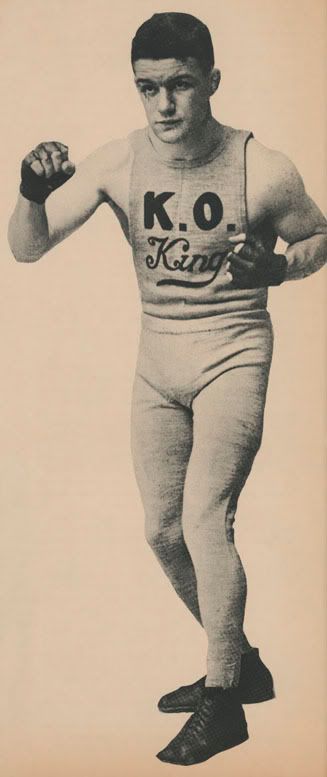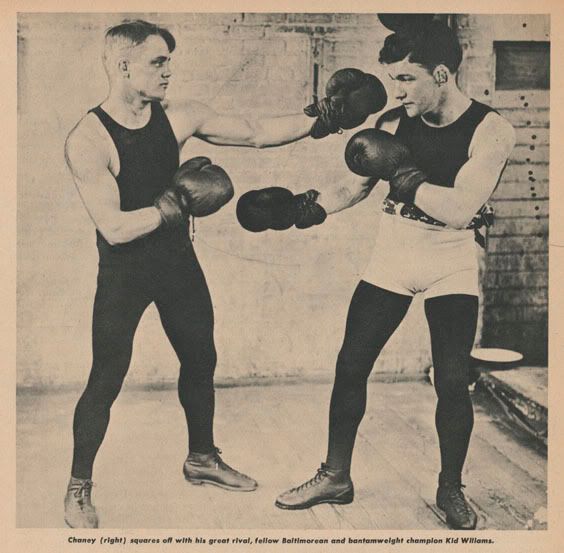Sports Through Edgren's Eyes
By ROBERT EDGREN.
By ROBERT EDGREN.
Pasadena, Cal., Saturday, Aug. 2.--Are modern boxers in a class with the old timers?
Every week I get a box full of letters from old-time boxers or fight fans who claim that the up-to-date champion is a counterfeit when compared to the strong boys back in the eighties and nineties, and before that. Hardly a day goes by without an eight-page protest from some veteran who used to go out into the woods to see John L. Sullivan fight, or who followed Jack McAuliffe or Jack Dempsey, the Nonpareil, or who watched when Kid Lavigne battled Joe Walcott to a stand still, or saw Terry McGovern go through Pedlar Palmer of England like a cyclone. The old-timers are loyal to old-time fighters. They think that modern ringsters ought to be behind ribbon counters. According to old-timers the champions whom we have today don't know how to put their hands up and don't know what real fighting is.
Dempsey an Exception.
So far as I have seen, there's little physical difference between old-time champions and champions up to date. There are as good men now as there ever were in the ring. The chief difference is that old-time fighters weren't influenced so much by the thought that winning meant a fortune and defeat was a form of bankruptcy.
The fight was the great thing in the old days.
The money is the big thing today.
Old-time fighters fought desperately and recklessly.
Modern fighters are extremely cautious. They take no risk that can be dodged. A championship is something to be grabbed if possible, and then to be held as long as possible by outwitting the other fellows who are after it. Dangerous matches are avoided, and the modern champion is very fond of no-decision matches, in which he can run or stall and hold his title if he finds he can't win.
Jack Dempsey is the only champion today who fights with the reckless abandon of the old-timers. Dempsey doesn't know how to stall, and wouldn't if he could. He is the biggest money maker the ring ever knew, and he takes good care of the money he earns, but in the ring he always goes out to win in the first round if he can. He'll dive in and trade punches with any man living. Dempsey likes money, but he isn't crazy over it. Manager Jack Kearns handles all the business and Dempsey concentrates his mind on the training and the fighting.
But there were some desperate birds in the old days. Bob Fitzsimmons would have delighted in taking on Jack Dempsey, confident of outmatching him in the battle of wits and slipping in the winning punch. Fitzsimmons feared nothing on earth and was most dangerous when he reeled around the ring, apparently helpless. Many times Fitzsimmons was nearly knocked out and won with a punch. Peter Maher had him on the floor, cold, for eight seconds. He got up, staggered into Peter with his hands down, and knocked Peter out with one terrific blow as soon as he could lift them again.
Knocks Carter Down.
I saw Kid McCoy knocked down and nearly out by the great yellow-haired fighter, Kid Carter, saved by the bell, walk out in the next round and totter across the ring to meet Carter in his own corner. McCoy couldn't lift a hand from his sides. His gloves dangled as he closed with Carter and ducked to break the force of punches that grazed his ears. It was fully a minute in that third round before McCoy could get his hands up, and when he did he hit Carter a hook that threw him half way across the ring and headlong into the ropes.
Desperate fighting followed, in which McCoy was knocked down six times, yet in the sixth round he was still on his feet, was forcing the fighting, and had Carter groggy and cut to pieces. McCoy was the cleverest boxer of his day, but desperate at all times. If he had come along now probably he would have been like most of the champions we see, a cautious business man.
Kid Lavigne at Maspeth, fighting the Barbadoes Demon, Joe Walcott, had both ears nearly torn off by blows, his eyes closed, nose broken, teeth splintered. Still he rushed and fought until Walcott broke under the fierce pace and backed away, beaten.
In his fighting prime Terrible Terry McGovern was knocked down just once--by Oscar Gardner. The blow dazed McGovern so that he was helpless. But the instinct to get up was so strong that when he couldn't shove himself from the floor he crawled to where Gardner stood waiting for him, and climbed up Gardner's legs to renew the fight. As soon as he was up, Terry began fighting again with a Berserk fury that soon had Gardner down--to stay. McGovern never practiced any defense; his whole defense was in the fury of his attack.
John L. Sullivan was desperate in all his fights. He was like Dempsey--always trying to win with a wild rush and in a flurry of furious fighting.
The fierceness of his attack made him such a reputation that most of the men who met him were half beaten before they came into the ring. If Sullivan had taken care of himself he never would have been beaten until old age took away his speed and strength. But he "drank like a fish" between fights, shirked training and degenerated into a fat and flabby caricature of the great John L. who used to knock men out with blows like the thud of a caulker's mallet.
One-Punch Winner.
And there was Peter Maher, who came from Ireland with a punch in either mitt such as has seldom been seen. An awful hitter, Peter was, and desperate enough to please anyone. I never took any stock in the tales that Peter had a yellow streak. Peter never feared any man but Fitzsimmons, and he had plenty of company in that. Many times I've seen Peter come up from a knockdown--for he had a glass jaw in later days--and put that sock over for a one-punch win.
Joe Gans was a master boxer and had a style that perfectly combined defense and attack--the greatest I've ever seen except that of Fitzsimmons. Gans learned much from old Fitz. His great strength was in counter-hitting, but when he wanted to he would walk in and beat his man to punches until something dropped. If Gans hadn't been forced to fight "to orders" by Manager Al Herford he would have been remembered now as the greatest knockout artist the lightweight class ever had.
Stanley Ketchel was the last desperate fighter among the middleweight champions. Since his time they've been a slapping, dancing, cautious lot, not to be compared with the oldtimers like Dempsey, Fitzsimmons, Ryan, McCoy and Ketchel.
Jim Corbett was the first super-careful heavyweight. He perfected a marvelous defense, but never had a trace of Jack Dempsey's recklessness in attack. A beautiful boxer Corbett was, but never a great fighter, as his record shows. His pride was in boxing. If he had been a fencer his weapon would have been the rapier, not the broadsword or claymore. Jeffries, a great champion, came later. Then Jack Johnson, who developed marvelous skill in defense and counter-hitting, but lacked boldness in attack. Willard was a fighter because of his bulk. He had little heart for it, although he was perfectly game.
Leonard's Comeback.
Of the modern champions, Benny Leonard combines real fighting aggressiveness with skill, when in the ring. But Benny is very careful in his match making. He has more business sense than recklessness in his composition. Benny is a gamester at that. He has been knocked down several times, and badly dazed in fights, yet he always comes back to win.
Benny was telling me a story about his fight with Ritchie Mitchell, whom he knocked out after a desperate battle.
"Ritchie hit me an awful clip and the next thing I knew I found myself on the floor," said Benny. "I didn't know how long I'd been there, and as my head cleared I rolled up to my knee to see the referee. As I looked I saw Billy Gibson's face under the ropes, and it was the tip-off that something awful was happening. Bill was white as a ghost and his mouth was open and his eyes bulging out like marbles. He looked so comical that I nearly laughed. I heard the count and saw I had a couple of seconds yet, so I turned and waved to Bill to ease his mind, and managed to get up. But I was nearly gone that time. It was my closest call in the ring. I stalled until my strength came back and was lucky enough to put Ritchie out."
Leonard describes it modestly. But his recovery on that occasion was no less remarkable than his recovery when Willie Ritchie nearly had him in San Francisco, or when Charlie White knocked him through the ropes and he came back to knock Charlie out.
Modern fighters, on an average, know as much about boxing as the oldtimers. They have developed a different style in short bouts. They are in better condition, for the fighter who dissipates in these days can't get anywhere against the strong competition. But they aren't desperate. They don't go headlong and put everything on a punch. You see that kind of thing, of course, but it's in the preliminaries.
The champions, except Dempsey, don't take such risks. It isn't business.

